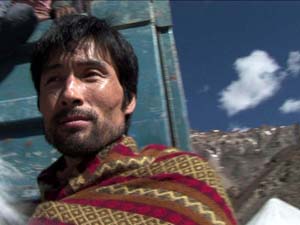KIM Eung-su, born in 1966, is a director who makes abstract movies that deals with the pains and grief of Korea’s history. In his own words, he spent his 20s fighting against the world and his thirties wandering in it. A politically engaged student, KIM felt inspired by the creativity of the student movements of the time and entered in 1990 the film department of the Seoul Institute of the Arts after graduating in psychology from the prestigious Seoul National University i...
More
KIM Eung-su, born in 1966, is a director who makes abstract movies that deals with the pains and grief of Korea’s history. In his own words, he spent his 20s fighting against the world and his thirties wandering in it. A politically engaged student, KIM felt inspired by the creativity of the student movements of the time and entered in 1990 the film department of the Seoul Institute of the Arts after graduating in psychology from the prestigious Seoul National University in 1989. Shortly thereafter, he dropped out and became a member of the association Film Factory Chungnyun in 1991, leading him to take part in the writing of <Mother, Your Son> (1991), a “people’s film” notorious for being the point of contention that led to a rare physical confrontation between students and the police on a campus (the Korean Ethics Committee for Performing Arts didn’t deliver a license for the film due to its “class consciousness propaganda and incitement to strikes” but students still moved forward with a public screening of the film). Later that year, he moved to Moscow, Russia, to study filmmaking at the Gerasimov Institute of Cinematography, the oldest film school in the world. There, he first made the medium-length <Andante Cantabile> (1993) and the short <Another Face> (1994) with Kazakhfilm studio before writing, producing and filming his debut feature <Time Lasts> (1996) with the legendary Mosfilm. The black-and-white movie juxtaposes young Koreans who were activists in the 1980s, an age of doctrines and ideologies, with their changed selves years later. With this film, KIM introduced what would become one of his trademarks, namely blurring the line between documentary and fiction. After his return to Korea, he first worked on a project of film adaptation of journalist HONG Sehwa’s essay <I Am a Taxi Driver in Paris>, which he ultimately had to give up, and provided the original idea for Myung Films’ influential title <Waikiki Brothers> (2001) directed by YIM Soon-rye. Soon after, KIM moved on with the drama film <Desire> (2004), which was particularly noted for its unique formalism. One of his following films, <Heavenly Path> was another fiction film that borrows the esthetics of documentaries, this time following the itinerary of the director’s previous trip to North India. <The Past Is a Strange Country>, released in 2008, is a documentary about two college students who burned themselves to death in the heat of anti-American demonstrations of 1986. Instead of a faithful reconstruction of fragments of the reality, the documentary was an experiment that wove the views of the director himself and the opinions of later generations. His 2012 documentary <Without Father>, about two Japanese women living in Korea who go on a trip to visit their fathers in Japan, received the Public Critiques’ award at the Jeonju International Film Festival. With <Oh, Love> (2017) and <The Real> (2017), KIM dealt with the aftermaths of the 2014 Sewol Ferry disaster. His latest titles, <That Obscure Object of Desire> (2020) and <Wandering Camera> (2019) revolved around the late former president of the Republic of Korea, ROH Moo-hyun.
Less









